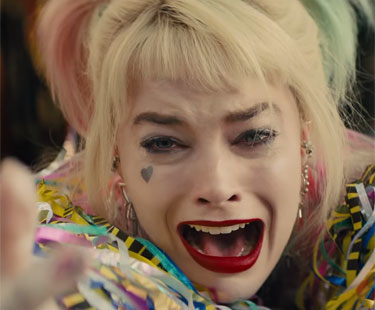With the box office receipts from Birds of Prey’s opening weekend officially tabulated, the numbers have revealed two rather shocking statistics: 1) the audience that pulled themselves out of their cocoon to go see it was 54% male and over 25 (likely a healthy amount of creepoids with cosplay fetishes) and 2) it made 33.2 million dollars domestically and 81 million dollars internationally, way under original projections that were already modest to begin with (the studio expecting to make at least 45 million domestically).
Considering the very femme-positive overtones, as further highlighted by the movie’s accompanying all-female musician soundtrack, it comes as a great surprise indeed that the film should fail to, at the very least, speak to its core audience. The one that the marketing department had very clearly tailored to women and, yes, girls. But, unfortunately, the people behind the classification of the film had misguided faith in the notion that, like the more “lad-driven” movies, Deadpool and Joker (Harley Quinn’s greatest source of pleasure and pain), that have most recently taken a chance on an R-rating, parents would want to take their daughters to such a movie. Yet maybe the entertainment industry has been too long protected by its progressive bubble to realize or remember that, outside of Hollywood, there’s still a pretty narrow-minded view about how to raise girls versus boys. While it’s all fine for a preadolescent boy to see something like the aforementioned two comic book-based movies, a girl seeing the violence of Harley Quinn and her crew play out with unapologetic rage on the big screen isn’t “entertaining”–it’s in “poor taste.”
Maybe this is why Birds of Prey gets written off by critics as all style and no substance while Joaquin Phoenix is winning Oscars for his Joker performance. One imagines it will be a very long time, if ever, that a female portraying a villainous hero will ever be considered for such high honors. And, in truth, this overall critique of BOP is very much a copout, a testament to the fact that critics believe they need to be emotionally tortured in order for a movie to be deemed “accolade and award-worthy,” as opposed to just another piece of Hollywood fluff. Yet, throughout Birds of Prey, there is a consistent underpinning of feminine rebellion and aggression portrayed as normal rather than anathema that makes it sure to be one of the most political films of the year. Harley with her Carole Lombard meets Madonna as Nikki Finn in Who’s That Girl lilt spins us the yarn in her own unreliable narrator way, explaining the feminine uprising afoot with the voiceover, “I wasn’t the only dame in Gotham looking for emancipation.”
Based on the box office response to the movie, however, there’s still quite a bit of emancipating to do. As well as a long, hard look parents might want to take at themselves with regard to the double standard they’re clearly employing for their daughters, while their sons exposure to violence is “natural.” Perhaps there’s still hope for the movie to recoup some of its losses as the studio hustles to tweak and rebrand the title to the more direct Harley Quinn: Birds of Prey (what’s next? Censoring the movie to get a PG-13 rating instead?), just so there’s no confusion to the many feeble-brained lot out there. If the plan manages to work–and even if it doesn’t–one might want to heed the advice on one of the soundtrack’s songs and, “Lock up your sons, make way for the daughters/You be the lamb and we’ll be the slaughter/You burned the witches, now you’re defenseless/Who needs a Y with this many Xs?”
Regrettably, according to the primary audience as of now, Birds of Prey is still very much in need of the Y’s money if it wants to continue to stay afloat and make an impression. On a side note, maybe men have been waiting to be slapped around all their lives and BOP merely feeds their long dormant desire? Then again, the only other recent movie to really suggest that might be the case was 2015’s Mad Max: Fury Road. Oh, and that time men got all uppity about “women-only screenings” of Wonder Woman in 2017. The latter of which did considerably much better at the box office at least in part due to its PG-13 rating that made it a “safe” choice for “impressionable” girls.






















